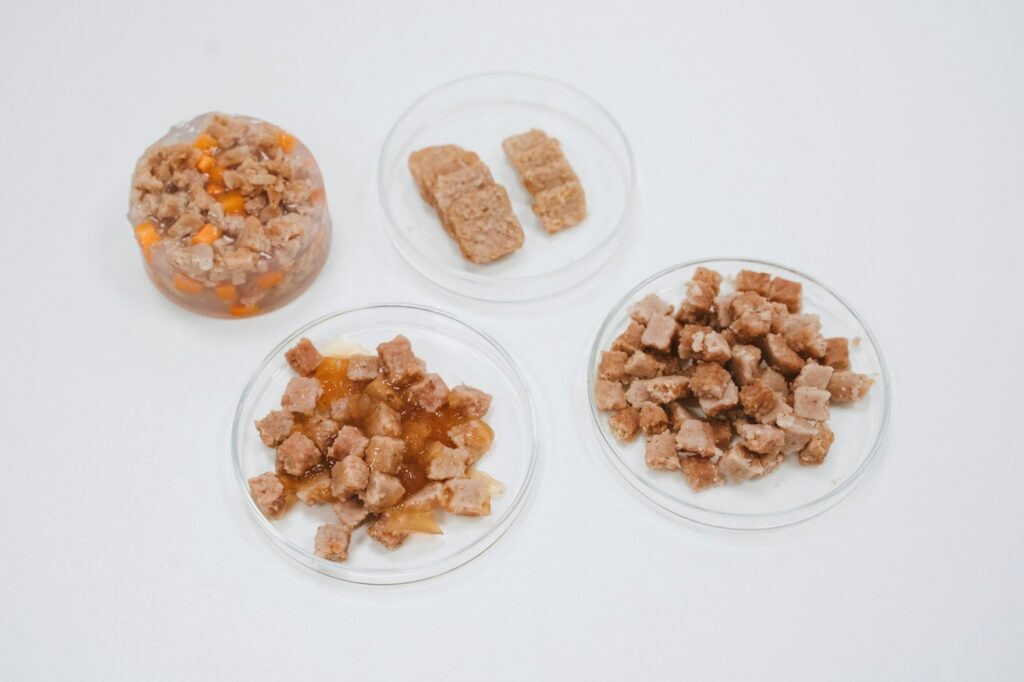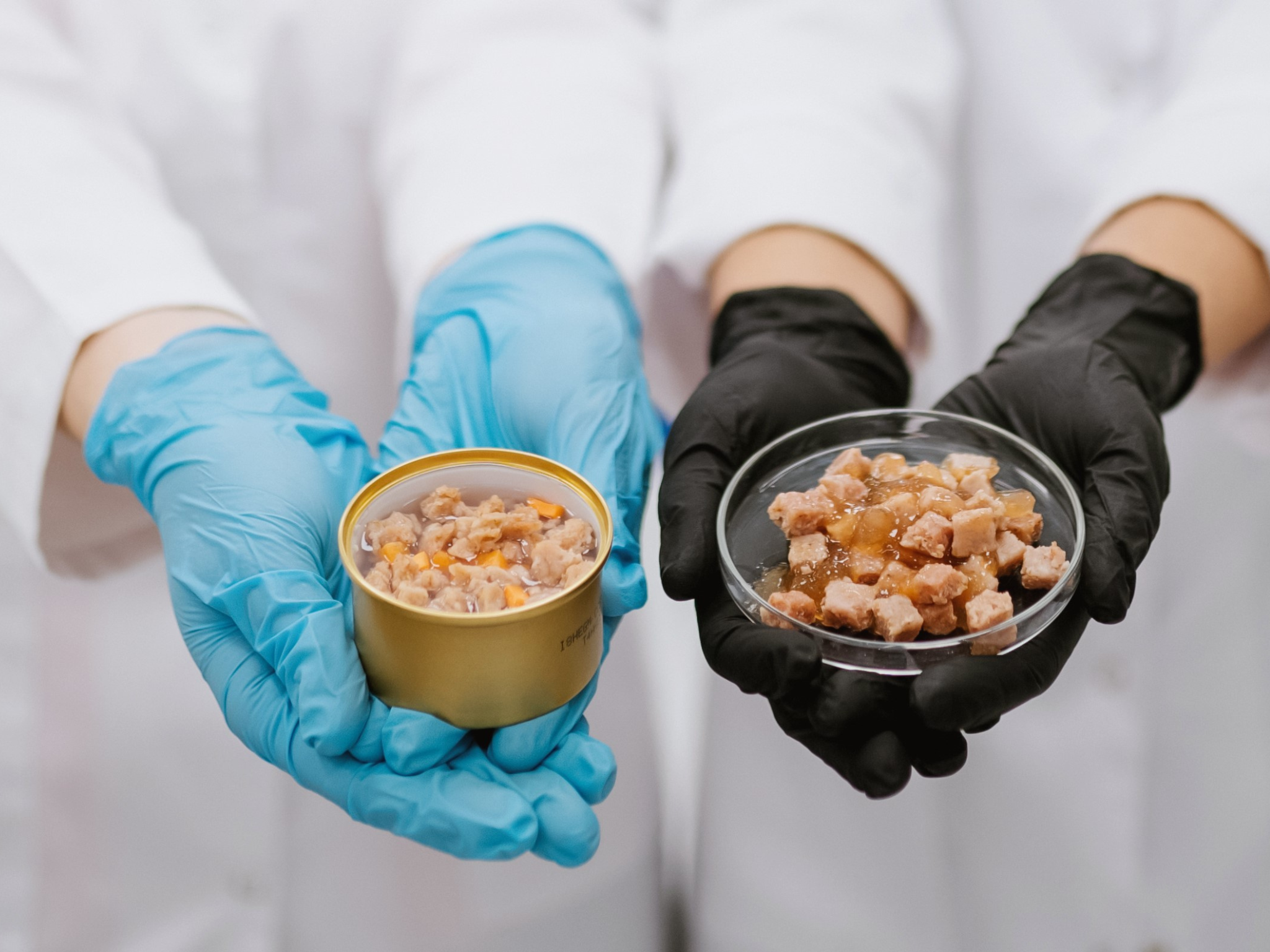Cultivated Meat for Pet Food ‘Significantly Better’ for the Planet Than Beef
4 Mins Read
Pet food with cultivated meat instead of beef fares far better for the planet and its resources, according to a new life-cycle assessment.
As it works to commercialise cultivated pet food, Czech biotech startup Bene Meat Technologies has revealed the environmental benefits its product offers over conventional meat.
It has published the results of a life-cycle assessment (LCA) determining the climate impact of producing cultivated meat for pets. The study found that Bene Meat’s pet food generates at least 84% fewer emissions than beef – depending on how the latter is produced, the difference could be as much as 95%.
It also uses between 80% and 97% less land than beef, with the potential to reduce this even further. And while these numbers were specifically calculated for pet food, the company believes its beef burgers for humans – which it unveiled last month – will perform similarly on the sustainability scale.
Smaller carbon footprint than beef and chicken

To conduct the LCA, Bene Meat collaborated with scientists from the Czech Technical University in Prague, focusing on the industrial production of cultivated meat. The analysis was peer-reviewed by University of Nottingham professor Jon McKechnie, who specialises in cost-effective resource utilisation strategies to achieve sustainability goals.
The company claims the LCA is the “most accurate insight” into the climate impacts of manufacturing cultivated meat at an industrial scale so far. McKechnie confirmed that the study followed established standards and key results were presented transparently and adequately.
Bene Meat’s cultivated pet food needs only 3.1 sq metres of land per kg of meat, which includes the growing of all necessary raw materials. For context, beef takes up as much as 120 sq metres, while producing a kg each of pork and poultry requires 7.2 and 6.6 sq metres of land. The company forecasts a further reduction to two sq metres per kg.
Meanwhile, producing it emits 5.28kg of CO2e per kg of meat, and this could be gradually decreased to 3.29kg. This figure includes all necessary raw materials and energy, as well as the impacts of producing all the equipment and other inputs needed for the process. In comparison, beef generates 33-100 kg of CO2e per kg, and chicken is responsible for 10kg of CO2e.
Since the study includes all input materials – which account for over half of all emissions of meat – it implies that the cultivated technology is so optimised and efficient that most of its related emissions occur outside Bene Meat’s facility, at the raw material suppliers, according to production head Petr Bebeníček.
“The uniqueness of our study lies in it being the first conducted and calculated on real production. Bene Meat is pleased with the study results and believes there is potential to further reduce these figures in the future,” Kateřina Dvořák Vašová, media coordinator for Bene Meat, told Green Queen.
The findings chime with the results of other LCAs – a peer-reviewed analysis in 2021 revealed that cultivated beef can lower climate impact by 92%, air pollution by 94%, land use by 95%, and water consumption by 78% compared to conventional beef.
Bene Meat working on several cell lines

“This LCA study provides the first comprehensive insight into the actual impacts of industrial meat cultivation,” said Miroslav Žilka from the Czech Technical University, who led the LCA.
“Our findings demonstrate that this technology has enormous potential, in terms of environmental impacts, and achieves significantly better results than, for example, traditional beef production,” he explained.
Žila will present more detailed information about the analysis at the International Scientific Conference on Cultured Meat in Maastricht, Netherlands next week. The results will also be published in a scientific journal soon.
Bene Meat has access to a variety of cell lines and currently plans to use different cell lines for pet food and human food, according to Dvořák Vašová. “We aim to begin as a supplier of feedstock in the pet food business,” she said.
The company was the first to register cultivated pet food as an EU feed material last year, though that is separate from the regulatory approval companies require to sell their products. Bene Meat recently submitted an application for its pet food to the US Food and Drug Administration. Currently, only UK startup Meatly is approved to sell cultivated meat for pets (in its home country), which it plans to roll out early next year.
Bene Meat has also managed to successfully store over 5,000 samples in a “cutting-edge” cell bank, and has previously hinted at a “significant update” on its pet food offering “in late 2024 or early 2025”.
“We believe that this study marks a key milestone in understanding the environmental impacts of cultivated meat, and confirms its potential as a sustainable source of protein,” said Tomáš Kubeš, head of strategic projects at Bene Meat.



